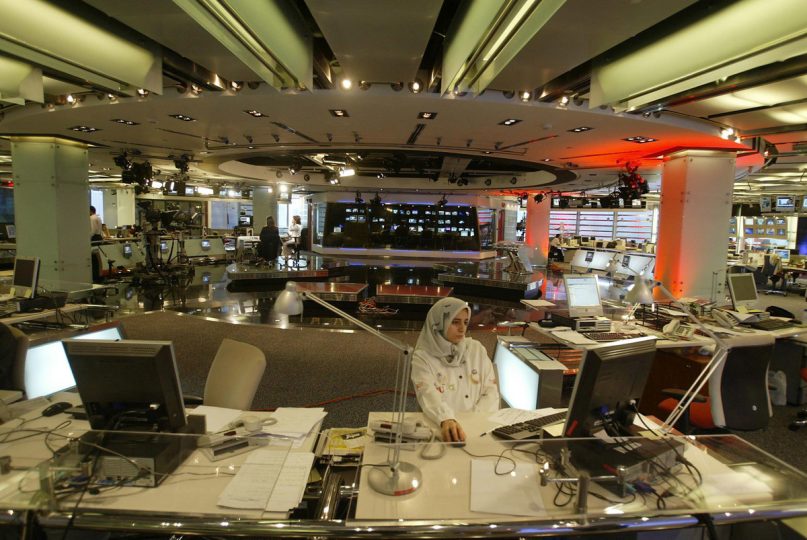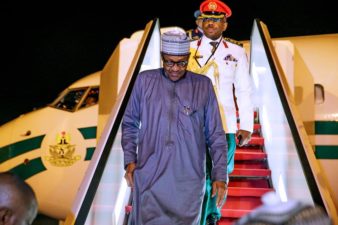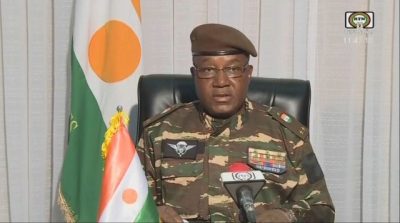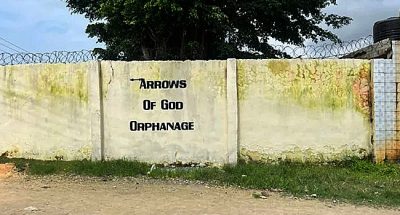Saudi Arabia’s Al Arabiya news channel is celebrating two decades of bearing witness to the world’s most significant events and bringing news from the Arab world — and across the globe — to millions of Arabic-speaking homes.
Since it was established on March 3, 2003, the broadcaster has placed itself at the forefront of the region’s news media, with operations in more than 40 cities worldwide and a presence in Saudi Arabia, Palestine, Iraq, Egypt, Lebanon, Jordan and Yemen.
“Compared to other media outlets, Al Arabiya has not diverted away from its initial mission, which is the (pursuit of the) truth,” Mamdouh Al-Muhaini, general manager of Al Arabiya and its sister channel Al Hadath, told Arab News.
“Our goal from day one has been to offer balanced political analysis and the best possible journalistic practice.”
However, Al Arabiya’s mission has not been an easy one in a region ravaged by turmoil, with its staff regularly facing threats, kidnappings, and even death.
“Many (of our) journalists have lost their lives,” said Al-Muhaini. “Al Arabiya’s offices have been attacked and bombed, and many people were impacted.”
In 2003, the channel was banned from operating in Iraq by the then-interim government after broadcasting an audio recording of the recently deposed president, Saddam Hussein, who at that time was still in hiding. Coverage in Iraq, however, resumed the following year.

Al Arabiya General Manager Mamdouh Al-Muhaini
Rising hostility toward journalists and attacks on press freedoms also meant the safety of Al Arabiya reporters was routinely in jeopardy.
In Iraq, the bodies of Iraqi correspondent Atwar Bahjat, engineer Adnan Khairullah, and cameraman Khalid Mahmoud were discovered on Feb. 23, 2006, just north of Baghdad after they were kidnapped by Al-Qaeda while reporting on the bombing of Al-Askari Mosque in Samarra.
Reporters Sans Frontieres described the killings as an “appalling act.” In all, 11 of Al Arabiya’s reporters have been killed or injured while reporting in Iraq.
The channel was also officially banned in the Gaza Strip after Hamas took control in 2006, but allowed local journalists to continue working with Al Arabiya following Israel’s “Pillar of Defence” operation in 2012, allowing the broadcaster to cover major events.
However, in 2020, Hamas went on to ban journalists from working for Al Arabiya after accusing the channel of spreading lies.
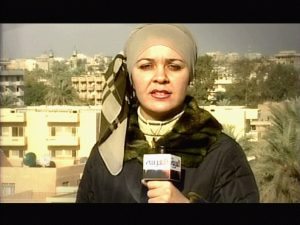
A TV grab taken off the Dubai-based Al-Arabiya satellite news channel 23 February 2006 shows an undated image of its reporter in Baghdad, Iraqi journalist Atwar Bahjat al-Samerai, who was assassinated in the central city of Samarra on 22 February. Three Iraqi journalists working for al-Arabiya were kidnapped and killed on the outskirts of Samarra, north of Baghdad, police said 23 February 2006. The three journalists had gone to Samarra yesterday to report on the bombing of a major Shiite shrine and on the angry demonstrations that followed. AFP PHOTO/AL-ARABIYA — AL-JAZEERA OUT — (Photo by AL-ARABIYA / AFP)
On Sept. 2, 2008, Iran accused the channel of bias and expelled Tehran bureau chief Hassan Fahs, before ordering the indefinite closure of the bureau for “unfair reporting” of the presidential election and the protests that erupted soon after.
In 2012, in the Philippines, terrorists affiliated with the Abu Sayyaf group abducted Jordanian journalist Baker Atyani and his team while they were attempting to interview its leader on the Sulu Archipelago.
Atyani and his team were not released until the following year, when Sheikh Mohammed Hussein, the grand mufti of Jerusalem, appealed to the group’s leadership.
“I spent 18 months in captivity, in the heart of the Sulu jungle, living among ignorant people, to say the least,” Atyani — who today works as the Arab News’ Pakistan bureau chief — wrote following the ordeal.
According to his account, members of Abu Sayyaf thought Al-Aqsa Mosque was in Spain and had not heard of Jerusalem.
In mid-2016, Al Arabiya was forced to shut down its Beirut bureau, citing security concerns amid threats from the Iran-backed Lebanese militia Hezbollah.
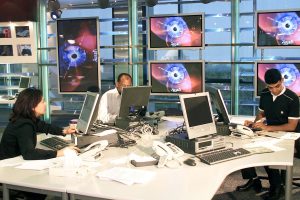
TV Reporter Amal Wanis from Tunis (L) Abdul Baki Awad from Sudan (C) and Mohammed Ashraf from Egypt (R) work behind the scene 16 February 2003, four days prior to the launching of the new Al-Arabiya 24-hour satellite news channel in Dubai. Al-Arabiya which will be launched on February 20 from Dubai by the Middle East Broadcasting Center (MBC), will give a “balanced alternative” to viewers who enjoy watching one of the main existing Arab satellite news channels, according to Ali al-Hedeithy, the head of Middle East News, the owners of Al-Arabiya. (Photo by NASSER YOUNES / AFP)
The satellite broadcaster said it was concerned “for the safety of its own employees and those employed by its providers,” adding that despite this, it would “continue to closely cover Lebanese affairs.”
In 2021, the Algerian Ministry of Communication revoked Al Arabiya’s accreditations over accusations of “resorting to disinformation and manipulation,” making it the second foreign news service in Algeria, preceded by France24, to have its permissions withdrawn by Algerian authorities.
And yet, these challenges have not hampered Al Arabiya’s on-the-ground reporting. Even with the rise of social media, the news channel has adapted to technological change and continues to defend the truth against fake news and misinformation.
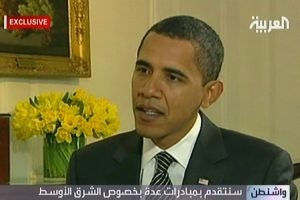
Al Arabiya became the first news channel to interview US President Barack Obama after he took office in 2009.
“In the last few years, we have utilized technology and artificial intelligence advancements to expand and improve our operation, but our prime focus has been true journalism, meaning our work with reporters and conflict coverage, which has been significant,” Al-Muhaini told Arab News.
“Today, we have over 180 million followers across more than 200 accounts. However, our main goal remains to present real journalism.”
Al Arabiya, which reached more than 36 million television screens across the Arab world in 2020, became the first news channel in the region to surpass 10 million YouTube subscribers, garnering more than five billion views on its videos as of January 2022.
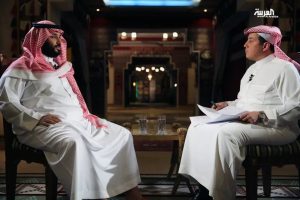
In 2015, Al Arabiya conducted the first television interview with Saudi Arabia’s then-Deputy Crown Prince Mohammed bin Salman, during which he announced the Kingdom’s Vision 2030 reform agenda.
Asked how the station was competing amid the rising number of influential Arabic-speaking newscasters, Al-Muhaini said: “Competition is always good… it provides incentives to keep improving and doing our best because the worst thing for news outlets is to have no competition. This is when media work begins regressing.”
Al Arabiya will always be committed to its fundamental principles, including “reliability, credibility, and balanced reporting,” he added.
Complementing the work of Al Arabiya is Al Hadath, which focuses extensively on conflict zones across the region. “Al Hadath has done a greater job than its sister news station in several areas, including Iraq and Libya, where it is quite popular,” said Al-Muhaini.
A top-ranking news channel in most MENA countries, Al Arabiya boasts a strong record of exclusive interviews. It became the first news channel to interview US President Barack Obama after he took office in 2009.
In 2015, Al Arabiya conducted the first television interview with Saudi Arabia’s then-Deputy Crown Prince Mohammed bin Salman, during which he announced the Kingdom’s Vision 2030 reform agenda.
Al-Muhaini confirmed that Al Arabiya as part of the Kingdom’s plan to turn the Saudi capital into a regional hub for business, media and entertainment.
“We are (today) in an excellent place on many levels — screen, social media, and journalistic practice,” said Al-Muhaini.
“We will launch programs from Washington, D.C. and London, and we will improve our social media presence. Our business will generally expand in many places,” he said.
“Soon, we will launch Al Arabiya Radio in Riyadh, our first radio station in Saudi Arabia… and we plan on reaching other parts of the Arab world… We will also expand our podcasts.”
Reflecting on Al Arabiya’s fight against fake news, especially during the COVID-19 pandemic, Al-Muhaini said disinformation was a global scourge that posed a huge challenge for media professionals.
“With the onset of the technological revolution, the world has been getting bombarded with information from unreliable sources,” he said. During the COVID-19 period, in particular, “lives have been lost because of false information.”
He urged viewers to turn to official news sources, such as Al Arabiya and other trusted outlets, as it is “impossible to eliminate fake news.”

